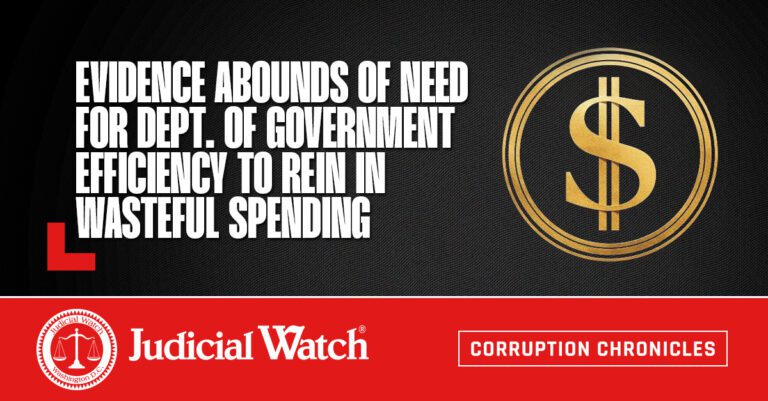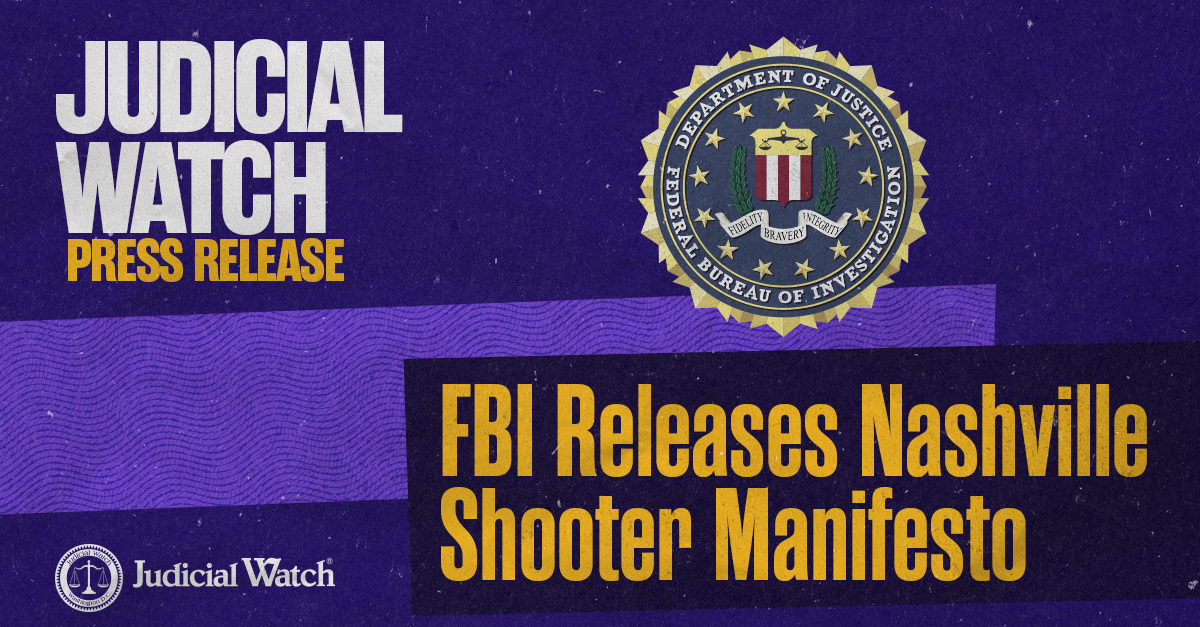
Evidence Abounds of Need for Dept. of Government Efficiency to Rein in Wasteful Spending

President-elect Donald Trump’s creation of a new Department of Government Efficiency to, among other things, cut wasteful expenditures is a welcome addition for American taxpayers who have seen record amounts of public funds go to all sorts of outrageous projects during the Biden administration. The much-needed office will be headed by billionaire Elon Musk, the head of electric car company Tesla, rocket company SpaceX and social media platform X and Vivek Ramaswamy, a pharmaceutical entrepreneur and Yale Law School graduate. Besides cutting wasteful spending the new department will be tasked with dismantling government bureaucracy, slashing excess regulations, and restructuring federal agencies. It will send shockwaves through the system, and anyone involved in government waste, according to Musk.
For decades Judicial Watch has exposed enormous amounts of government waste, and the problem has skyrocketed under the Biden administration. In 2024 alone, the Corruption Chronicles has reported on well over a billion dollars in reckless spending, which is just a snippet of a widespread issue because the entire list of wasteful government-funded initiatives is far too long. Of course, this does not include mandatory spending such as Social Security and Medicare, which have reached $1.46 trillion and $874 billion respectively in fiscal year 2024, according to figures published by the U.S. Treasury. This year the government has spent $6.75 trillion, which is more than it collected, resulting in a deficit. The spending includes critical areas such as military and homeland security, but there is a category listed as “other” in which the government doled out $238 billion this fiscal year.
Here are a few examples uncovered by Judicial Watch in a 10-month period that would likely be on the radar of a Department of Government Efficiency. Just a few weeks into the new year, Uncle Sam gave Bangladesh, an Islamic nation that hates America and serves as a recruiting ground for terrorist groups such as Al-Qaeda Indian Subcontinent (AQIS) and the Islamic State of Iraq and Syria (ISIS), $15 million to fight climate change. Bangladesh is also notorious for violating human rights, which the U.S. often cites as a deal breaker involving aid to foreign governments. A few weeks after giving the South-Asian Islamic country millions to combat climate change, the Department of Justice (DOJ) awarded a public university nearly $1 million, as part of Biden’s fictitious crisis to control information and censor Americans, for a project that tracks the spread of “mis-, dis-, and mal-information (MDM)” by internet users in real time.
As spring approached, the administration doled out over half a million dollars so researchers at a public university could apply controversial critical race theory in the treatment of opioid use disorder, which the government says disproportionately impacts minorities. Haiti continued to receive millions from the U.S. even after billions in aid perished, armed gangs took over the impoverished island and violence and lawlessness gripped the country. Money also kept flowing into Vice President Kamala Harris’s failed initiative to curb illegal immigration, with a $170 million spring infusion to a laughable experiment promoted as a magical tool that will improve life enough in three central American countries to deter citizens from coming to the U.S. illegally by creating jobs, supporting education and enhancing food security. The president claims the project tackles the “root causes” or drivers of irregular migration and he dedicated an astounding $4 billion to it even as illegal immigration from the three nations—El Salvador, Guatemala, and Honduras—shattered records.
The list of outrageous government-funded programs kept growing and as summer approached the administration dedicated half a million dollars to a project that reportedly combats misinformation in Africa and $4 million to reduce barriers that impede access to education and decent work for lesbian, gay, bisexual, transgender, queer, questioning, intersex (LGBTQI+) youth in Latin America and the Caribbean. When summer rolled around the government allotted $2 million to combat corruption in Mexican sports betting and a whopping half a billion dollars to build electric vehicle chargers in mostly underserved communities. The questionable spending extended into fall with a $46 million allocation from the U.S. Department of Agriculture (USDA) to tackle nutrition insecurity in underserved communities with a chunk of the money going to strengthen the food system for “Queer & Trans (QT) and Black, Indigenous People of Color (BIPOC),” provide illegal immigrants from Latin America with “culturally responsible fresh food” and the black immigrant community with a special “African food access” project. The list will undoubtedly grow as the Biden presidency comes to an end, illustrating the need to make government more efficient.
















